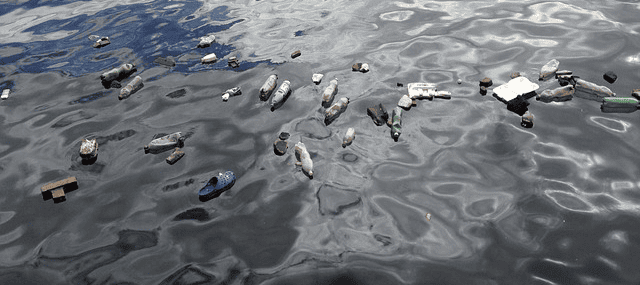Is healthcare behaving badly with plastic?
November 29, 2018 | Hospital waste, Plastic, Poison, Recycling, Sustainability, Waste
It’s time for the healthcare sector to demonstrate leadership in plastic recycling and the use of sustainable plastics.

By Matthew Ross, Creative Director, Page & Page
It had been a long Monday, and I had been to hockey training without dinner. I got in tired and hungry. Placed my dinner (lovingly prepared by my, now sleeping, wife) into the microwave, poured myself a large glass of milk, and turned on the TV to watch some sort of rubbish while I ate. A pattern of behaviour that I’m sure you recognise.
I found myself joining the middle of a programme titled ‘The history of rubbish’. As the remote control was tantalisingly out of reach, I found myself strangely drawn into the programme (alongside the irony of the situation). It wasn’t just detailing the past, but also how we may harness the power of rubbish in the future. It turns out that contemporary landfill can be surprisingly energising. However, as our historical landfill sites slowly erode into our riverways, there is of course a scourge. A scourge that plagues our coastlines and oceans. A poison that has become a cultural pariah.
 The healthcare provision enjoyed by us today would be impossible without plastic. For a long time now, I’ve been helping clients communicate their messages of convenience. The single use device here, or the hygienic plastic coating there. I’ve instinctively recognised the practical, compliance and financial benefits. Saving time and money by making things as easy as possible, combined with simple use that improves medical outcomes. This has to be the better way, right?
The healthcare provision enjoyed by us today would be impossible without plastic. For a long time now, I’ve been helping clients communicate their messages of convenience. The single use device here, or the hygienic plastic coating there. I’ve instinctively recognised the practical, compliance and financial benefits. Saving time and money by making things as easy as possible, combined with simple use that improves medical outcomes. This has to be the better way, right?
Well, apparently not. One of our clients belongs to the Healthcare Plastics Recycling Council (HPRC) who are looking to the future with a sustainable healthcare model. In the US alone, 14,000 tons of medical waste is produced in a day, 85% of which is non-hazardous.1 Much of this waste falls into a single use “take-make-dispose economy”. A trial collection project in Chicago co-ordinating the mass collection of waste from several hospitals, has been able to demonstrate the value of both recycling and energy conversion. By shifting our mind-set, and a little effort we can turn this around into a circular “make-use-return” economy.
Here in the UK we have a healthcare system that has been defined by the expertise of our dedicated healthcare professionals, but the internet is clearly providing a turning tide of patients who are arming themselves with vastly improved knowledge. People are beginning to take responsibility for their own healthcare. And with that personal responsibility comes a conscience.
Recently I’ve had cause to have conversations with clients who are finding that the end consumer is rejecting their product because it cannot be recycled. It may well be the most convenient, comfortable, and cheapest product available with the shortest treatment pathway, but is it sustainably produced? If not – then that conscience will carry the consumer to the slightly more inconvenient option.
Healthcare provision will have a longer grace period than straws, but clever and sensible manufacturers (whom possess some of the largest R&D resources on the planet) are already researching how to substitute their non-recyclable elements with sustainable options, and will no doubt make the most of these ‘advances’ in their marketing and intellectual property portfolios.
As responsible human beings we have known for some time that our plastic life of convenience has to be checked. As our historical landfill sites on marshes are eroded into by rivers – leaving our poisonous convenience exposed and composing into the seas and oceans – so we have to face up to both our personal and corporate responsibilities.
References: 1. https://www.hprc.org/about-hprc
This content was provided by Page & Page and Partners




